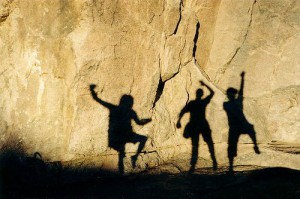-
 Learning in Relationship, by Ronald Short, is a book that I find myself re-reading again and again. I quoted from it in my post Inscaping at COCo a couple of months ago, but feel it’s worth revisiting because I think it contains a tremendous amount of wisdom. It spells out in simple and concrete language the relational skills that feed a more engaging organizational culture and that allow us to express our social change values more fully in our work. Here are some passages that I found to be particularly valuable:
Learning in Relationship, by Ronald Short, is a book that I find myself re-reading again and again. I quoted from it in my post Inscaping at COCo a couple of months ago, but feel it’s worth revisiting because I think it contains a tremendous amount of wisdom. It spells out in simple and concrete language the relational skills that feed a more engaging organizational culture and that allow us to express our social change values more fully in our work. Here are some passages that I found to be particularly valuable:You share a basic dilemma with everybody else on the planet. You live a rich life inside your head. You continually react, interpret, infer, and provide meaning to what happens to you. You create, author, edit, produce, direct and act in your own internal drama. Others can’t know what goes on inside you unless you tell them, but they often assume they do- so they don’t ask.
Others have rich lives inside their heads as well. They also react, interpret, infer and provide meaning to what happens to them. You can’t know what it is unless they tell you, but you often assume you do- so you don’t inquire.
Everything flows from these simple facts.
…Because you cannot know what is in another person’s head unless you are told, you are confronted with the fundamental, existential, social predicament that happens simply because you are human- you are often not aware that you are not aware. You don’t know what you don’t know- and you don’t know that you don’t know.
The only way out of this dilemma is to learn from each other in the moment. The only way you can learn is for both of you and others to describe your stories about each other and inquire whether they are accurate. At it’s simplest level, learning from others means that you do four things:
1. acknowledge that what is in your head is a story that you are making up;
2. share it;
3. inquire about the other person’s story; and
4. revise your story based upon the new information.…This is pretty risky, so you may do what folks normally do- sit around and wait for others to make it safe before you share your story. While you do that, you can write elaborate stories about why it is unsafe for you to speak out, why others are not sharing theirs, and what is wrong with all these folks anyway. You can live a rich internal life.
…The answer to this dilemma is not easy because we need to risk before we can trust- not the other way around.
…We all face this dilemma. When we do not take risks and share our stories, what we truly risk is that fear and mistrust will rule.
(pg.7-12)
Here are a few other excerpts from the book that I like:
Any patterns you and your colleagues have are created by all of you. You are all active, card-carrying members who help maintain them. It is far easier to see the other’s behavior than to notice how your behavior invites the other’s behavior and thus co-creates the pattern. (pg. 45)
Any effort to change your organization must begin with you and your specific interactions with specific individuals. (pg. 17)
We judge ourselves by our intentions and others by their actions (pg.?)
The secret to learning is to observe, not to change yourself. (pg. 80)
Our biggest, yet least visible, problem is that we think the world is outside of us. (pg. 22)
To own that you create the impact that others have on you is without a doubt, the most difficult and important lesson to learn. It is a solitary, existential decision that only you can make. (pg. 85)
Nothing changes until one person leans in to listen. (pg. 123)
The book is chock full of practical examples and skill-building tips. I highly recommend it.
Learning in relationship




One Response and Counting...
Wow. A few extremely powerful (and difficult!) reminders about walking the path I want to in regards to developing community with others and myself…
Thanks Tana. Deep food for thought (and action!) indeed.